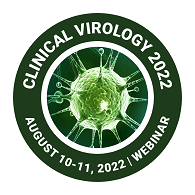
Dr. Naushad Khan
University of California
Title: Identification of potential targets for drug discovery
Biography
Biography: Dr. Naushad Khan
Abstract
Human infection with the Chikungunya virus is rarely deadly but frequently accompanied by persistent joint and muscular pain. Chronic CHIKV illness is extremely crippling and linked to persistent viral infection. Chikungunya virus (CHIKV), which had previously only been an endemic pathogen in Africa and Asia that occasionally caused outbreaks, became a global pathogen starting in 2004. Given that CHIKV outbreaks have persisted and grown in size, finding possible vaccine and therapy options needs to get careful investigation. Since no licensed products exist in this area, control is solely dependent on the use of integrated vector control and personal protective measures, both of which have limited efficacy. So it makes sense to look into additional control options right away. The effectiveness of antivirals strategies in preventing diseases carried by researchers has been demonstrated. Therapeutics would be quite beneficial as well, though, given that CHIKV is known to spread quickly and cause high attack rates. A number of contenders are now being explored; this assessment discusses the various options being thought about for potential future drug development and evaluates their relative benefits.
Keywords: Chikungunya disease, Molecular docking, pharmacokinetics (PK) and pharmacodynamics

